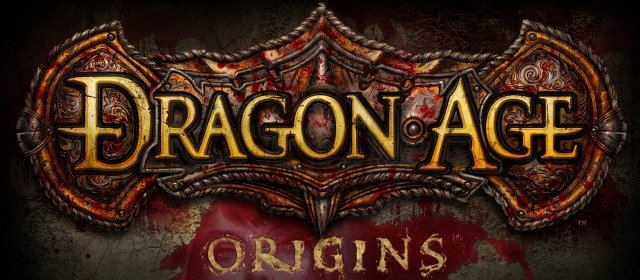Role-playing gamers over a certain age (and those under a certain age but with a taste beyond their years), will remember a PC classic called Baldur’s Gate, first released in 1998. An isometric party-based RPG set in the Forgotten Realms universe, Baldur’s Gate is seen by many as a seminal work, maybe even genre-defining. The isometric viewpoint combined with the ability to assign actions to your party via the pause menu (or tweak their A.I. behaviour to relieve you of the responsibility) made for an incredibly tactical loot-athon that has rarely been bettered in the years since its release.
Upon its launch in 2009, a full 11 years later, Dragon Age: Origins was considered to be a spiritual successor to Baldur’s Gate. The party dynamic and tactical pause menu drew immediate parallels with BioWare’s older game, and the high fantasy setting isn’t a million miles from the Forgotten Realms universe, despite being a world devised entirely for Dragon Age (in fact, even its name Thedas alludes to THE Dragon Age Setting, true story). It tells the tale of a world on the brink of all-out war as the Darkspawn hordes amass for a full-on assault of the Kingdom of Ferelden. The only thing that can stand in the way of this tide of evil is a group of elite warriors known as Grey Wardens, who imbibe – and survive – lethal Darkspawn blood in order to enhance their abilities.
It’s a heady mix of magic, heroes, sex and gore, but coming back to Origins now, four years since its release and having seen a full sequel and a multitude of other high-quality Western RPGs unleashed in its wake (Kingdoms of Amalur: Reckoning, Dragon’s Dogma, The Elder Scrolls V: Skyrim, The Witcher 2: Assassins of Kings), how does 2009’s Best Role-Playing Game measure up?
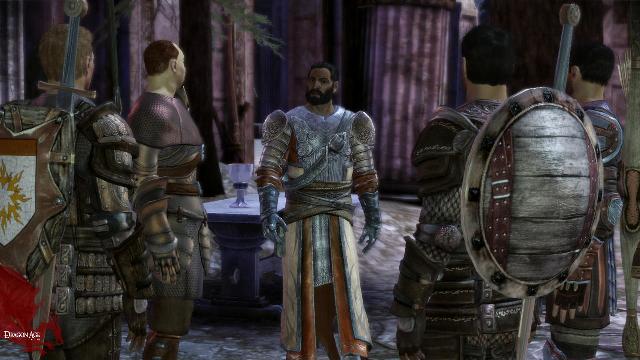
HUMBLE BEGINNINGS: At the time of release, the major selling point was the Origins system, whereby every character you create is moulded in one of six templates crafted from a combination of class, race and background. The Dalish Elf and City Elf have their beginnings in the countryside or the city of Denerim, respectively; the Dwarven Noble and Commoner both start out in the Dwarven city of Orzammar; the Human noble begins life as the child of a wealthy lord and the Mage (which can be Human or Elf but share a common origin) starts their quest with the Circle of Magi.
These Origins are an excellent introduction to the world and the mechanics and, even though once you’re beyond them one playthrough will only vary from another by dint of your personal moral choices (though your Origin of choice will play a part at specific points), they present the illusion of having real impact, with each one just as compelling as the others. The interesting thing is how these Origins shape not only your story but also your relationship with your character. You’re given far more opportunity to put yourself into the character than in, say, Mass Effect or even Dragon Age II, because you’re not playing a pre-shaped character with recorded dialogue. The player character in Dragon Age: Origins has several speech options for every occasion, and although it’s all in text (all other characters and NPCs are fully voiced) you do get a feel for the type of character you want to be.
No matter your origin of choice, you’ll eventually meet Duncan, a Grey Warden visiting your city/castle/forest to recruit new members to help fight the evil Darkspawn, and allying yourself with him will see you whisked off to begin your (short-lived) training right before the Battle of Ostagar, where you meet the very pleasant King Cailan and the not-so-pleasant General Loghain. If the Darkspawn are allowed to swell their ranks, there will be a Blight (at a very basic level a full-scale Darkspawn invasion), and the Grey Wardens and brave King Cailan intend to stop it before it begins. However, betrayed by Loghain, both Cailan and Duncan meet their messy ends at Ostagar, leaving you and the noble but sarcastic Alistair as the last surviving Grey Wardens in the country of Ferelden – and tasked with the simple job of saving the world.
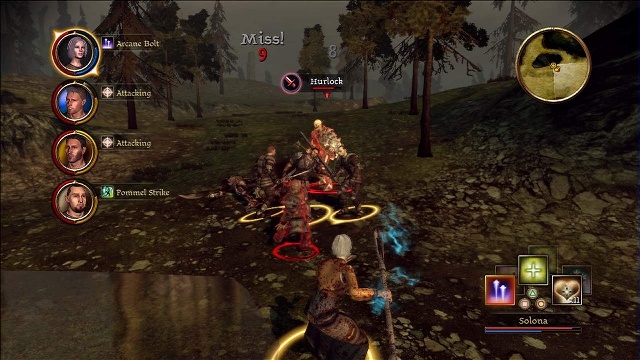
BORED OF THE RINGS: It’s fair to say that elves and dwarves and dragons, etc, have been given a decent amount of coverage in video games over the years, whether thanks to the Forgotten Realms license, the Dungeons & Dragons Rulebook or adaptations of Tolkien’s genre-shaping Lord of the Rings saga. Dragon Age: Origins doesn’t exactly go out of its way to reinvent any particular element of the high fantasy genre, but it does pull on its big boys boots before it starts stomping all over the well-trodden ground. It’s not quite “Game of Thrones” gritty, but BioWare aren’t afraid to occasionally show the world of Origins in an unflattering light.
With Elves painted as the immediate racial underdog (in a similar vein to how they’re portrayed in Andrzej Sapkowski’s The Witcher series), Origins puts its own spin on the real-world issues of petty colour-prejudice and dresses them up in a different version of the same conflict. With Dalish Elves settled in the wilderness away from the humans they detest and cannot trust, City Elves are treated as second class citizens, slaves or labourers, despite their strength, intelligence and superior magical capabilities. The racial tension combines with the simmering rancour that exists between the Circle of Magi and the order of Templars – the sword-arm of the Chantry, Origin’s answer to the church.
Interestingly, women appear to hold equal footing with men in Thedas. Once knighted they’re referred to as “Ser”, as are the men, and they hold positions of power and authority (particularly in the female-led Chantry) that would have been unheard of in our own Dark Ages. Characters like party member Morrigan (voiced by FarScape/Stargate’s Claudia Black) and her shapeshifting mother Flemeth (played by the wonderful Kate Mulgrew) manage to avoid over-sexualisation in favour of some impressive depth, even if the “forbidden fruit” characterisation of apparently vulnerable archer and rogue Leliana threatens to undermine it a little.
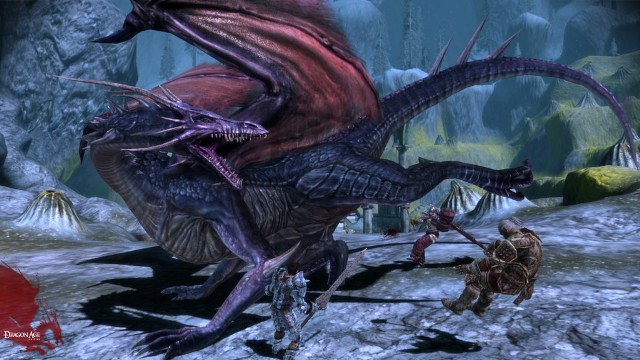
SACRED ASHES: As with BioWare’s Mass Effect trilogy, characterisation in Dragon Age: Origins is at the forefront of what drives the story. While the plot itself is nothing new (betrayed newbie sets out for revenge and uncovers a world-saving destiny), the dark world and the morally ambiguous characters set it apart. Even fellow Grey Warden Alistair, ostensibly blond-haired, blue-eyed and Hollywood wholesome, harbours a terrible need for vengeance against Loghain; Oghren the bawdy, drunken dwarf nurses a broken heart and elsewhere the seductive, suggestive Elf Zevran is on the run from a deadly past. They may not be wholly new archetypes, but there’s certainly a lot more to them than you’re immediately faced with. Only the towering Qunari warrior Sten, as black and white as they come, wears his feelings on his sleeve – but even his past is chequered here and there.
The mix of characters and the moral tightropes they walk make for a great party dynamic when you’re out in the world that goes far beyond your combat set up. You may well intend to go down the tank/healer/ranged/damage per second route when it comes to your party make-up, but often your strategic decisions will be influenced by which characters you want with you at any given time. I fell in love with DLC golem Shale and Leliana, which thankfully meant I always had a high-damage character and a Rogue around to open locked chests, but I could have easily eschewed such things just to listen to Morrigan and Sten discuss the gory details of Qunari sexual relations, or hear Zevran flirt with an uncomfortable Alistair. It all adds up to a much more immersive experience, and gives you more to focus on than just fighting and looting. The approval system that governs your relationship with party members is an intriguing dynamic on its own, and can mean the difference between slipping between their sheets or slipping a sword between their ribs. Gifts are scattered throughout the world, and each character has a unique trinket to find that will go a long way to getting you on their good side.
NPCs are an interesting bunch, too, who often develop in their own way. Usually characters from a particular Origin will show up later on having evolved in some way; they may require help, or they may require killing, but each time it closes a loop that feels like an evolution for your own avatar. A great example is Jowan, a fellow mage-in-training you meet in the Magi origin. He’s been accused of dabbling in forbidden Blood Magic and is set to be made Tranquil (a nasty process that removes a mage’s connection to the Fade – a sub-world where Magic is born – rendering them unable to perform magic or feel emotion), and intends to run away with the Chantry sister he’s in love with. However you handle it during the Origin, he’ll turn up later having caused a chain of events that could further destabilise an already fractious nation. His re-entry into the narrative is seamless and important, and reinforces your belief that this is your own story to tell.
DRAGON RAGE: Obviously, it’s not all talking, and in fact Origins is an occasionally combat-heavy RPG. Fights usually involve a full party of four versus a significantly higher number of enemies, requiring a certain amount of tactical thinking even on the default difficulty. Classes come in the usual RPG flavours of Warrior, Mage, Rogue, but the disparate skill trees allow for further customisation so, for example, a mage could be a Healer or a Shapeshifter, while a warrior may thunder in with a two-handed broadsword or take up a one-handed weapon and a shield for tanking. A decent mix of party members is important, but thanks to the relationship system it’s not always possible – or, at least, viable – to stick to the same party. Pilfering sacred religious sites is unlikely to go down well with Leliana or Senior Mage Wynne, for instance, while Morrigan and Sten won’t be bothered by such things.
Each class and sub-class (and, later on, each speciality of a class) has its fair share of abilities to suit most eventualities. Sword-and-board Warriors can generate threat to keep the enemy focused on them, while two-handed fighters can stun their opponents to create openings; Rogues can vanish and use backstabs to deal massive damage, or switch to a bow for long-range or multiple-target attacks; Mages can specialise as healers or in offence, producing massive area-of-effect and crowd-control spells to turn the tide in a fight. The right combination of skills and abilities is just as essential as keeping your equipment up to spec, especially when you’ve got spells that will react with each other in surprising – and not-so-surprising – ways. For example, throw down a Grease spell before a fireball and watch the world burn, or use a Mage to freeze an enemy and a Warrior to charge in with a heavy attack like Sunder to smash them into tiny pieces.
An in-depth behavioural modification menu allows you to craft a party that will think on their own until thinking on their own becomes dangerous, for example making sure a Mage uses a life-steal spell when they reach 40% health, or ensuring that a Warrior always protects the healer from enemies that are too close or particularly powerful. You can assign any skill to a multitude of behaviour slots based on a huge amount of battle variables, making every fight a very tactical – and personal – experience.
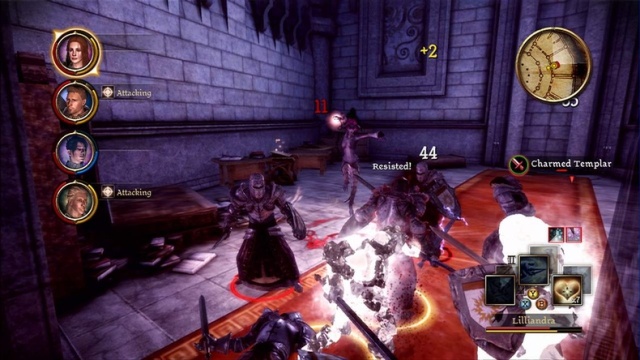
TRAVEL FATIGUE: One of the major negatives in Dragon Age: Origins (aside from the decidedly muddy visuals) is that the world is not open. While the plot isn’t linear and you can travel Ferelden recruiting various factions to your cause in whatever order you choose, the environments are reached by selecting new areas on a static map, and many are used and reused again and again. It was never a real issue for me, but it’s easy to see why it annoys gamers who prefer the wandering and sense of scale of, say, The Elder Scrolls series. At first it’s almost refreshing to be able to avoid the long treks associated with many other games – but then, that’s what a fast travel system is for, and Dragon Age: Origins can sometimes feel far too linear without actually being linear.
Stingy maps aside, the biggest complaint aimed at Origins concerns the visual fidelity. Persistent gore and a “mature” fantasy world are all well and good, but when the aesthetics are so ropey it’s hard to fully appreciate them. The framerate suffers horribly during bigger fights (on the console version, at least), and there’s a blandness to some of the environments that screams of resources going elsewhere. Whether it bothers you or not is a purely preferential thing. I, for one, can overlook rough graphics in favour of solid, compelling gameplay, but some people simply can’t – and I can understand why. A game like Origins that presents such a well-developed world should look impeccable wherever possible, in order to show off that world in all its glory.
Making up for it slightly are the vocal performances by the cast, from veteran voice actors like Steve Blum (Oghren) and Simon Templeman (Loghain) to TV stars like the aforementioned Kate Mulgrew and Claudia Black. The script is excellent, remaining on the right side of hammy while evoking a rich fantasy world with its own slang terms and idioms, the dialogue, above all, conveying character.
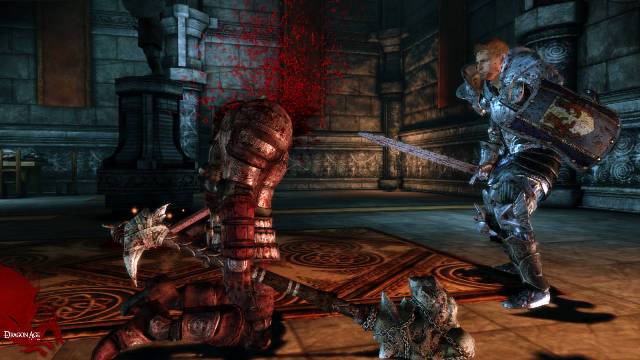
MAKER HELP US ALL: So, how does Dragon Age: Origins measure up against today’s RPG big-hitters? In all fairness, pretty well. The Witcher 2 does elves and dwarves better, Skyrim does fantasy worlds better, Kingdoms of Amalur: Reckoning does class progression better and Dragon’s Dogma does fighting dragons way, way better but – and this is an important but – that’s not to say Origins does any of them badly, and the things it does very well trump the competition to this day. Moral choices that affect the world and a persistent, malleable narrative really are BioWare’s most powerful weapons and they proved it with aplomb in Origins.
There are moments when a seemingly innocuous action can turn one of your party members against you and force you to fight them to the death – an occurrence even more upsetting than if they simply fell permanently in combat, which can also happen at certain points. It’s telling that expansion pack Awakening introduces several new party members (including Dragon Age 2’s Anders), but the only Origins character to return to the Warden’s side is Oghren, who just happens to be the only one who can’t meet some kind of permanent end in this game. Everyone else can die at some point in the game, and if your actions contribute to such an end it’s hard not to feel horrible about yourself for a few hours afterwards.
All in all, Dragon Age: Origins might not be the best RPG ever made, and it was arguably bettered by it’s sequel and will be again when the Frostbite 3-powered Dragon Age 3: The Inquisition arrives early next year, but it’s an incredibly playable – and incredibly replayable game nonetheless. Factor in the mature themes, not just violence, sex and homosexuality, but issues of racism, class prosecution and vengeance, the deep, multi-branching story and the excellent characterisation and you’re left with a game that absolutely stands the test of time. It may not quite be a modern classic, but it’s an RPG that can stand proudly among the best of this console generation.


